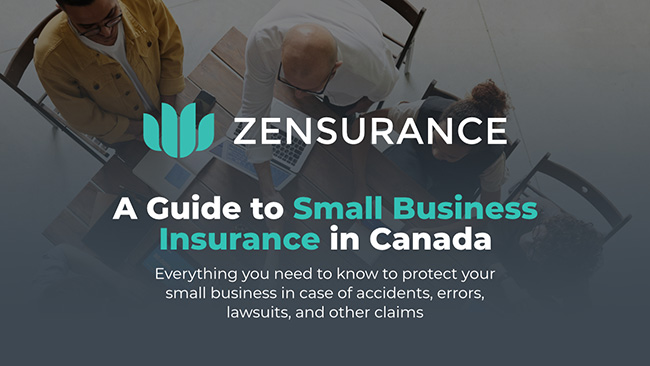Mowing lawns and providing lawn care services to residential, commercial, and industrial clients can be a lucrative small business.
According to data from IBISWorld, Canadian landscaping revenue expanded at a compound annual growth rate (CAGR) of 6.6% since 2018 to be worth an estimated $18.4 billion in 2023. Even during the pandemic, Canuck landscaping and lawn care businesses fared well, with revenue climbing by 12.8% in 2020 alone.
Young, aspiring entrepreneurs may be thinking about establishing a lawn care business. Although it’s a highly competitive industry, there’s always an opportunity to develop a healthy client list and run a profitable small business by differentiating yourself from your competitors.

Download Our FREE Insurance Guide
Learn everything you need to protect your small business.
Whitepaper download
"*" indicates required fields
Your email address will be used by Zensurance to provide latest news, offers and tips.
You can unsubscribe at any time.

Related Posts
Sign Up for ZenMail
"*" indicates required fields
Categories
One way to do that is to provide your clients with a valid certificate of insurance that verifies you’re invested in protecting yourself and your clients with lawn care liability insurance.
Do I Need Insurance to Mow Lawns?
Even if your existing or upstart lawn care business only offers basic lawn care and grooming services to residential clients, it’s essential to protect your finances and reputation. In many cases, your target clientele may not hire you without knowing you have a landscaping and lawn care business insurance policy.
After all, costly accidents, mistakes, contract disputes, or theft and vandalism can strike any small business owner in any industry without warning.
What Kind of Insurance Does a Lawn Care Business Need?
Like your lawn care business, a landscaping insurance policy is unique. It’s a customized policy that addresses the various liability risks you face. As your business changes and grows, your insurance policy does, too, when you renew it annually to ensure you’re adequately protected.
At a minimum, your lawn care business insurance policy should include the following types of coverages:
- General liability insurance to cover third-party bodily injury or property damage claims.
- Tools and equipment insurance to pay for damages or theft of lawn mowers and other gear.
- Commercial property insurance protects your finances from the cost of fire, water damage, theft, and vandalism at your lawn care business property.
- Commercial auto insurance pays for damages if you get into a car accident while travelling from one location to another (private-passenger car insurance is not designed to cover business vehicles).
There may be other coverages you need to build a comprehensive policy. For instance, pollution liability insurance if you also offer weed and insect control by using herbicides and pesticides. Or cyber liability insurance to protect yourself from the financial fallout of a cyber-attack or data breach if you use a point-of-sale (POS) system, have a website, exchange emails with clients and take online bookings. You can always speak to a licensed Zensurance broker if you have questions about the type of insurance your grass-cutting operation needs.
5 Ways to Assess Your Lawn Care Insurance Cost and Requirements
Here are five steps to take to determine what an insurance policy for a lawn mowing business should cover:
1. The liability risks you face
Every type of business, big or small, has liability risks. Consider all possibilities, from accidents that cause injuries or property damage to your clients or passersby because of your work, a fire at your office or warehouse that damages your contents and inventory, or an email phishing attack that compromises your business’s and clients’ confidential information. That will help guide you when weighing your lawn care liability insurance options.
2. The value of your tools and equipment
The tools and equipment you own, rent, or lease are essential to caring for your clients’ properties. If they’re stolen, vandalized, or damaged by a fire or water, the repair or replacement cost is not insignificant.
3. The grass-cutting and other services you offer
Draft a list of all the lawn care and related services you offer your clients. Each service you provide should be accounted for in your lawn insurance assessment. Failing to do so can prove problematic if you must file an insurance claim and find out you’re not covered.
4. The deductible you choose
Most insurance policies include deductibles. That’s the portion you must pay upfront after filing a claim before your insurance provider pays out. You can choose the deductible amount, typically $500, $1,000, or more. In general, the higher the deductible, the lower your annual premium. But choose wisely! If you opt for a high deductible, ensure you have the funds set aside to pay it if necessary.
5. Talk to a Zensurance broker
Working with a licensed business insurance broker at Zensurance is the ace in your back pocket. That’s because they’re insurance and risk mitigation experts who can advise you on what insurance to buy and what coverage limits to select. They customize a policy to suit your lawn care business. Hence, you’re neither underinsured nor overinsured, and they can shop from over 50 insurance providers to get the low-cost protection you need.
How to Get Low-Cost Lawn Care Business Insurance
Zensurance specializes in serving Canadian small businesses, entrepreneurs, self-employed professionals, independent contractors, and startups. Being a small business ourselves, we get the challenges that come with starting and growing a company.
It only takes a few minutes to fill out our online application for a free quote. Our friendly broker team doesn’t cut corners. Let us help you grow and protect your business with a tailored lawn care insurance policy that shields your finances if something goes wrong.
Related Posts
How to Prevent Phishing Attacks
Phishing attacks are among the most pervasive cyber-attacks against small businesses and independent professionals. Learn more about it and how to prevent your company from falling prey to it.
Zensurance Business Grant Winner 2024: Down East Dance Academy
Meet our $10,000 and $1,000 small business grant winners, their advice for other business owners and entrepreneurs, and why insurance is an essential part of their financial wellness.
5 Common Winter Business Insurance Claims
Accidents and mishaps leading to insurance claims can happen to any business owner at any time, but winter weather can raise the stakes considerably. Here are five wintertime claims our clients had to contend with and how their insurance coverage helped them recover.








